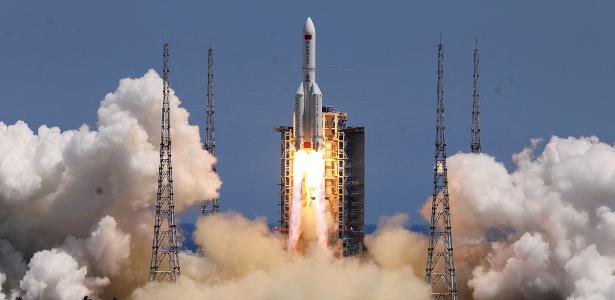The launch of China’s 21-tonne Long March rocket into space is alarming some astronomers around the world. According to them, there is a risk that parts of the released substance will not disintegrate upon return to Earth and fall at high speed at points on the Earth that are still impossible to predict.
A Long March 5B rocket left Beijing’s Wentian station in the early hours of Sunday (24) and moved a solar laboratory to the Tiangong Space Station. It arrived at the site on time, but some of its units don’t have any “control plane” to return to Earth.
According to astronomer Jonathan McDowell, a member of the Harvard-Smithsonian Center for Astrophysics, data from the US Space Command shows that parts of the Long March 5B rocket “float on their own.”
“The main stage of the 21-ton rocket is still in orbit. It has not been actively de-orbited,” the expert wrote on Twitter.
So far, there are no persistent warnings issued by the US military or any space command about the “trajectory” of the rest of the missile.
According to the space news site Space, the risk of “injury” as a result of falling missile units in the world is low, but the object launched by China has a “large” size.
An article in Nature Astronomy described the practice of allowing missile parts to return to Earth uncontrollably as an “unnecessary risk”.
Similar cases
This is not the first time that the return of a missile to Earth has caused concern. In May, parts of another Chinese-made Long March missile crashed in the Indian Ocean, north of the Maldives, raising fears at the time that it might land in a populated area.
even with Missile debris falling into the sea On this occasion, Administrator of the US Space Agency (NASA), Bill Nelson, issued a disclaimer in which he accused the Asian country of “failing to comply with the standards of responsibility in relation to space debris”.
On previous occasions, China has dismissed accusations of irresponsibility, with the government saying the risk of harming “something or someone” in such situations is “extremely low”.



![[VÍDEO] Elton John’s final show in the UK has the crowd moving](https://www.lodivalleynews.com/wp-content/uploads/2023/06/Elton-John-1-690x600.jpg)


More Stories
What ChatGPT knows about you is scary
The return of NFT? Champions Tactics is released by Ubisoft
What does Meta want from the “blue circle AI” in WhatsApp chats?